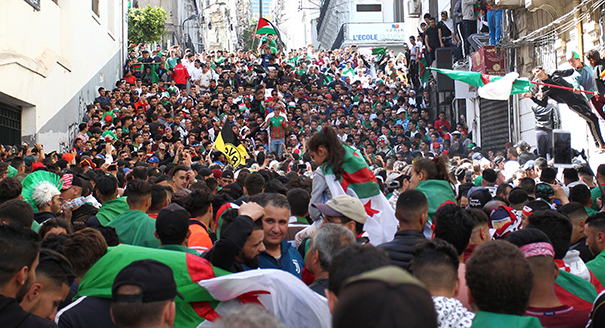Dalia Ghanem is a resident scholar at the Carnegie Middle East Center in Beirut, where her work examines political and extremist violence, radicalization, Islamism, and jihadism, with an emphasis on Algeria. Recently, Ghanem was in Algeria during the uprising against a fifth term for president Abdelaziz Bouteflika, and in early March she described the situation there in a Diwan interview. In mid-April she sat with Diwan again to explain why Algerians were continuing to protest despite Bouteflika’s departure, to look forward at the presidential election scheduled for July 4, and to examine the role of the military in the country’s political transition.
commentary
Forward to the Past?
In an interview, Dalia Ghanem examines the political transition in Algeria and sees signs of danger ahead.
by Ghida Tayara
Published on April 30, 2019
More work from Diwan



- commentaryAssad’s Downfall Echoes Across the Mediterranean
In eastern Libya, Khalifa Haftar had close ties with the Syrian dictator, and has now lost a soulmate.


 collectionArab Spring 2.0
collectionArab Spring 2.0Countries in the Middle East and North Africa have been witnessing a resurgence of the uprisings that had swept the region in 2010 and 2011. Many experts described what was called the Arab Spring as a failure, with countries descending into conflict or reverting back to autocratic tendencies, while populations abandoned protest squares. Yet with the unwillingness of Arab governments to tackle the many sources of dissatisfaction at home, citizens have returned to the streets to demand good governance and economic opportunities in twelve of the 22 Arab countries. Carnegie scholars in Beirut and throughout the region offer their analyses of this new wave of protests, explaining its causes, characteristics, and consequences for the politics, economies, and security of the countries involved, and for the broader region in general.
- commentaryAnatomy of a Military Fall
Why did Bashar al-Assad’s armed forces fail to act, unlike those in Egypt, Libya, Algeria, and Sudan?
- commentaryEastern Syria After Assad
The SDF has expanded its control over Deir al-Zor, but may soon find itself overstretched and facing Turkish allies.




